La Tatwana: The Tragedy of a Guatemalan Herbalist
Reading Time: 13 min
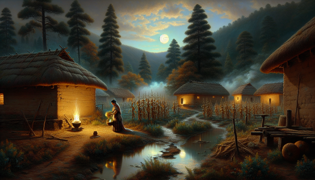
About Story: La Tatwana: The Tragedy of a Guatemalan Herbalist is a Historical Fiction from guatemala set in the 18th Century. This Dramatic tale explores themes of Justice and is suitable for Adults. It offers Cultural insights. A sorrowful chronicle of La Tatwana, whose healing hands faced cruel superstition in colonial Guatemala.
Introduction
The crisp air of the Guatemalan highlands carried the sweet tang of pine needles and the distant hum of quetzal wings. Smoke curled from the blackened chimneys of adobe cottages like tendrils of a dreaming serpent. At dawn, dew clung to maize stalks in glimmering pearls, yet beneath such pastoral calm, dread festered like a hidden wound. La Tatwana rose before cockfowl stirred the sky, offering her hands to tale and tincture. Her voice was as soft as dew-laden petals, and she moved through fields like moonlight dancing on obsidian, gathering herbs and murmuring prayers taught by her grandmother’s lips. Púchica, they’d murmur when she passed, as though sympathy and suspicion intertwined. No hay mal que por bien no venga, her mother would sigh, hoping good would bloom from hardship.
In the neighbouring hamlets, rumours took wing. A cow calved prematurely; a child woke screaming at midnight; a man’s fever would not break. La Tatwana’s name fell from trembling lips like a dark petal drifting on a river of fear. By midday, the texture of gossip was gritty, sharp as the night air before a storm. Villagers pressed against sun-baked walls, whispering of familiars in the forest—black cats slinking between trunks—and of charms hidden beneath her skirts. The adobe walls seemed to absorb every furtive glance, every furtive word. A low rumble of voices, like distant thunder, signalled the storm to come.
Yet she tended wounds and fevers still, offering unguents scented of marjoram and cinnamon. The promise of relief shone in her dark eyes, warm as molten amber. But hearts grew hard. By dusk, torches flickered at every crook and corner. The scent of burnt pine drifted on the breeze, mingling with the acrid tang of accusation. Then came a single cry: "She speaks to spirits!" That cry spread through the valley as swiftly as fire fanned by wind.
Whispers in the High Valleys
Before the sun had climbed above the jagged peaks, villagers huddled by the well and spoke of shadows where none should fall. La Tatwana, known to some as Remedios, moved among them with grace that unsettled wary hearts. Villagers offered her yuca soup, yet turned away when she hummed an old chant. That melody, borrowed from the Quiché, was as familiar as a lullaby yet as foreign as moonlight on obsidian. At the market, she sold jars of salve infused with chilli petals and marigold. Her touch could ease a labouring mother or staunch a child’s fever. The aroma of the ointment was bright, almost electric, mingling citrus zest and damp earth.
A young girl, María, ran to her one afternoon, tears slick on her cheeks like little glass beads. "Mi señora, my brother’s leg aches worse than the jungle’s hunger." La Tatwana examined him, murmuring prayers over the swelling sinews. When she pressed her palm to his skin, the boy shivered as though touched by a ghost. Yet by dinner, the fever broke. The villagers rejoiced for a moment but soon spoke of bargains struck with unseen forces. One elder muttered in a low tone, "She trades with spirits beyond our ken."
On the third dusk, the church bells clanged, summoning the faithful to vespers. La Tatwana knelt at the back, her head bowed. The incense burned white and sweet, drifting like a veil before the altar. Her fingers twitched as rhythms of sooted incense—cedar and myrrh—wafted against her skin. Each note of the mass echoed through the timber rafters, weaving a tapestry of hope and dread.
Outside, men gathered. They wore sombreros tipped low, eyes hard as river stones. "There goes the witch," one hissed. "No hay mal que por bien no venga, but this is too much." Their voices rose, rough as agave fibres scraped raw. By lamplight, they plotted to seize her the next dawn, believing her to be the cause of every misfortune. A low wind moaned through the valley, carrying the scent of pine resin and distant rain. Madrid may have been striving for reason, but here, superstition had taken root like a rampant vine.
They came for her at sunrise. La Tatwana awoke to the sound of her basket tumbling, herbs scattering like fallen stars across the flagstones. Rough hands gripped her arms. Her eyes, deep wells of sorrow, met theirs unflinchingly. "I mean no harm," she murmured, voice trembling yet steady. "I seek only to heal." But they bound her wrists with ropes as coarse as the villagers’ fears. By the well where she once drew water, they dragged her toward a platform hastily built of timbers. The crowd surrounded her, faces shrouded by torchlight and suspicion. The scent of damp pine and sweat mingled, thick and choking. No mercy lingered in their gaze.
Thus the high valleys, where birds once trilled like silver bells, filled with the clatter of accusation. The air tasted of bitterness and pine dust, and the stones beneath her feet trembled with the weight of injustice.
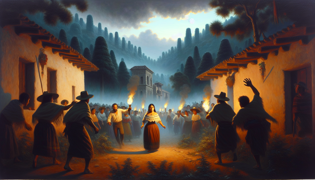
The Moonlit Trial
Under a hooded sky, lanterns swung from low-hanging branches of an ancient cedar. Villagers formed a circle around a hastily erected bench of rough planks. La Tatwana stood before Don Esteban, the magistrate whose powdered wig gleamed in golden light. A hush fell, broken only by the rustle of dry leaves and the distant cooing of mourning doves. The scent of spilled kerosene mingled with the earthy perfume of wet bark.
Don Esteban cleared his throat, voice firm as granite. "Madam Remedios, they call you La Tatwana. You are accused of witchcraft and consorting with malefic spirits. How do you plead?" The magistrate’s question hung in the air like a suspended dewdrop.
She lifted her chin, dark eyes bright with defiance. "I plead not guilty to a crime I never committed. My only sin is to heal with herbs and words of hope." A flicker of torchlight danced across her face, lending her an almost ethereal glow, as if moonlight had taken human form. Her dress, embroidered with colourful thread, reminded some of a passionate sunrise caught in fabric.
Accusers stepped forward. A midwife claimed that La Tatwana’s poultices had drawn blood at a newborn’s brow. A peasant swore his wife miscarried after taking her tea. "She is a poisoner!" cried one, voice cracking like dry wood under pressure. Another insisted he heard her chant to unseen forces beneath the new moon. Their words fell like split stones in a silent pool, rippling outward.
La Tatwana’s advocate, Alcalde Herrera, appealed for reason. "These are unsubstantiated tales, laced with envy and fear. This poor woman serves her people without charge, without malice. Shall we punish kindness impetuously?" The candles flared briefly, then guttered, casting grotesque shadows against adobe walls.
A woman in the crowd—a young mother with grief-lined eyes—raised her voice. "My daughter’s convulsions stopped only when La Tatwana pressed her palm to her forehead. I saw no devilry, only compassion." A murmur ran through onlookers like a tiny tremor. Some crossed themselves, uncertain. Some spat at the earth.
Yet superstition ran deeper than charity. An effigy of leaves and twine lay before the bench: a crude doll marked with burnt herbs, intended to summon curses. The villagers jeered as Alcalde Herrera argued that the doll proved accusations, not malefic intent. "A child plays with straw and string here, and we call it sorcery?" he pleaded. The magistrate lowered his gaze, burdened by conflicting counsel.
Outside the ring, the distant rumble of thunder foretold rain. A single drop splashed onto a lantern, hissing in protest. La Tatwana turned her gaze skyward, as though seeking mercy from the heavens. The air crackled with electric tension. Then, with a heavy heart, Don Esteban pronounced verdict: condemnation by fire. The words fell like a death knell, and the crowd surged forward, torches brandished, voices rising like a storm’s rattle. The cedar branches shivered, and the scent of ozone mingled with fear.
By the time the magisterial gavel echoed, she had already been torn from her plea. Under the moon’s cold eye, justice found its victim in flames.
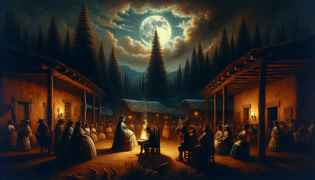
Flames over Cinta's Grove
They led her to the pyre at the edge of Cinta’s Grove, where towering pines formed a dark amphitheatre. The ground was soft with fallen needles, prickly beneath bare feet. Torches ringed the woodpile, their flames dancing like defiant spirits. La Tatwana, her hands still bound, climbed onto the timbers with measured steps, her heart pounding like a drum in the hush.
She paused, inhaling the sharp tang of resin and ash. The scent was fettered with dread, sticky as sorrow. Her gaze found Alcalde Herrera’s among the crowd, but his eyes were downcast, regret flickering like a hidden ember. An old woman spat onto the ground. "This is righteous fire," she muttered, voice cracked by years of fear. "May it cleanse the earth."
La Tatwana lifted her chin. "May my spirit find peace where yours shall not," she whispered, words as fragile as moth wings. A sudden breeze stirred the branches overhead, sending a shower of pine needles drifting like startled snow.
Torchbearers stacked kindling around her ankles, shaping the pyre like a crown of barbs. The leader struck flint and steel; sparks skittered across dry wood. A single match ignited a torrent of flame that roared upward, licking her ankles first. The flames climbed, greedy as wolves, and light crackled like laughter in a cruel tongue.
Her shirt caught quickly, the fabric hissing as it burned. Pain came in fierce waves, but she stood tall, a statue carved of sorrow and something fiercer still. The heat pressed against her skin, a relentless tide. She closed her eyes, and the world grew golden behind her lids. Footsteps scuffed the soil. A sob broke free—someone in the crowd, maybe Alcalde Herrera himself, mourning too late.
Smoke coiled skyward, thick and black, blotting out the stars. It carried the scent of pine tar and charred flesh. For a moment, everything seemed suspended: the crackle of flame, the hiss of burning cloth, the murmur of villagers seeking absolution in her destruction.
Then the roar of fire reclaimed the grove. Sparks rained like embers from a dying sun. The cedar limbs overhead glowed, as though the heavens themselves had caught flame. In that blistering light, La Tatwana became less a woman and more a legend—an ember of defiance seared into memory. Her final breath rose in a plume of smoke, whispering through the pines like an ancient spell.
When they doused the embers, they found only ashes and a single charred sprig of marigold fallen at the pyre’s heart. The villagers scattered, burdened by the weight of what they’d done. In the silence that followed, the grove wept a soft patter of rain, each drop hissing upon hot stones like tears for the innocent.
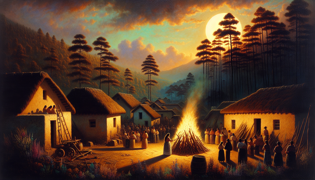
Echoes of a Fallen Petal
After the flames died down, Cinta’s Grove was hushed, its needles damp with rain and dread. Wherever the pyre stood, the earth lay scorched, as though scorched by grief itself. The marigold sprig, blackened but intact, lay on a stone like a tenacious promise. Alcalde Herrera knelt and picked it up, the petals brittle yet defiant. "She was no witch," he whispered, voice thick as mud.
In the days that followed, the villagers felt a hollow chill, like a gust from an open grave. Mothers hushed their children at twilight, recalling the woman who healed with fire and tears. The midwife refused to touch the sarcophagus of doubt; the farmers felt furtive eyes in the shadows of their fields. Some whispered, "Justice has left us cold."
A travelling friar arrived, bearing crucifixes and papal edicts. He spoke of purge and penance, oil and indulgence. Yet even he paused before the scorched earth, as though words failed him. "Perhaps mercy was misplaced," he admitted in a low voice. "Perhaps the Lord will judge us instead."
No hay mal que por bien no venga, her mother had said. True enough, for seeds of remembrance took root. Stories of La Tatwana—her kindness, her final defiance—flowed through valleys and villages like mountain streams. Bards sang of her in market squares, their voices rising with salt and longing. They likened her to a crimson petal caught in a storm: fragile yet unbowed. At bonfires, children pressed their faces to mothers’ knees, wide-eyed, hearing tales of a healer who spoke to earth and stars.
Years passed. The grove remained untended, but wildflowers sprouted amid blackened needles. Thyme, marigold and rue sprang up in riotous defiance. Their blooms shone bright as midday suns, painting the grove in hues of hope among the scars. Pilgrims came, leaving handfuls of herbs at the pyre’s stone, murmuring prayers as soft as feathers. They carried bits of bark and petals home, believing that where her ashes lay, healing lingered.
And so, La Tatwana lived on—in every sprig of marigold, every whispered prayer beneath cedar boughs, and in the conscience of a village learning that good intentions can be strangled by fear. Her story endured, a testament that the human heart must choose between mercy and malice. The vales echoed with her name, a fallen petal that blossomed new life in memory. Even today, if you walk Cinta’s Grove at dawn, you might sense the faint perfume of cinnamon and marjoram on the breeze—a reminder that innocence, once lost, can never fully be consumed.
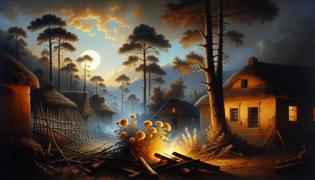
Conclusion
Seasons changed, and the world beyond the high valleys marched on with new rulers and edicts. Yet the legend of La Tatwana remained woven into the tapestry of Guatemalan lore. Her name passed from lip to lip, carried on the breath of wind that rustled through maize fields. Some claimed her spirit lingered where marigolds bloomed, offering solace to the plagued and weary. Others visited Cinta’s Grove, leaving fresh herbs at the old pyre’s stone, a silent act of contrition.
In time, the church erected a small shrine at the grove’s edge. It bore no statues—only a simple plaque etched with her name and a single line: "Here died one who sought to heal." Pilgrims knelt upon the dew-wet grass, the cool morning air fragrant with pine resin and damp earth. They whispered prayers of forgiveness and justice for a life extinguished by fear.
Though centuries have passed, her story endures as a warning and a balm. It reminds us how quickly empathy can curdle into suspicion, how justice can be twisted into vengeance. Yet it also shows that memory, like a stubborn seed, can sprout hope from the ash. La Tatwana’s legacy thrives in every healer’s hand, in every villager’s caution not to judge too hastily.
Thus, beneath a sky that has watched generations rise and fall, the echoes of her courage call us to choose mercy over malice. May we learn from the flames that consumed her body but could never scorch her name. For in remembering La Tatwana, we honour not just a woman wronged, but the healing power of compassion that even time cannot consume.

















